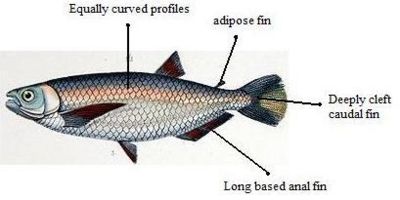Characins
The characin family includes around 1,300 species, distributed across Central and South America, and Africa. Most of these fishes school in lakes and rivers.
Body shapes and sizes vary considerably, from 2 in (5 cm) long pencilfishes to the stocky African distichodus species, which measure 16 in (41 cm). Piranhas and pacus are muscular and heavily built to facilitate the tearing of flesh or fruits. Other characins , in contrast, may persistently eat aquarium plants. Characins have sharp teeth in the jaws and mos have an extra fin, known as the adipose fin, on the back. The family contains many popular fishes, including the tetras, of which the brilliant Neon and Cardinal Tetras are prime examples.
Most characins spawn using egg-scattering methods. The male may have tiny hooks on the anal fin to hold the female against him during spawning. The eggs are adhesive and usually lodge among plants. One exception is the Splashing Tetra, which deposits eggs on a firm surface out of the water, to protect them from the attentions of aquatic predators.
Tetras
When compared with larger characins, such as the Pacu, the diminutive size of the smaller tetras illustrates the great range within the family Characidae. Temperaments, likewise, vary in the extreme, from the tranquility of the Neon Tetra to the ferocity of the Piranha. Native to South America and Africa, all characins make decorative additions to the aquarium - there are about 1,200 species in the wild. They have teeth in their jaws, unlike cyprinids. Many carry an additional small adipose fin behind the dorsal fin, although this is not an exclusive feature of characins (some other genera have it too, e.g., Corydoras catfish). Many smaller tetras are readily bred in soft waters, but very often the eggs are light sensitive.
While this article is titled "Monotypic", it is actually about any characin that does not fit neatly into other categories
Other Characins
While the smaller species of the characin group (see tetra) are more commonly kept in the aquarium, the species listed in this article section, belonging to related family groups, have equally strong claims for aquarium consideration. Hatchetfishes (Gasteropelecidae), pencilfishes (Anostomidae), and piranhas (Serrasalmidae) are all equally interesting to keep.
- Marbled Headstander
- Striped Anostomus
- Ternetz's Anostomus
- Bloodfin (fish)
- Big-scaled African Characin
- Blind Cave fish
- Black-winged Hatchetfish
- Marbled Hatchetfish
- Myer's Hatchetfish
- Pink-tailed Chalceus
- Spotted Headstander
- Pacu
- Red-spotted Copeina
- Splashing Tetra
- False Silver Tetra
- Silver Distichodus
- Longnosed Distichodus
- Nobol's Distichodus
- Six-Barred Distichodus
- Gasteropelecus sternicla
- Adonis
- Black and Yellow Leporinus
- Frederic's Leporinus
- Eight-banded Leporinus
- Lipstick Leproinus
- Schreitmuller's Metynnis
- Glass Tetra
- Diamond Tetra
- Silver Dollar (fish)
- One-lined African Tetra
- Golden Pencilfish
- Red Pencilfish
- Brown-tailed Pencilfish
- Three-lined Pencilfish
- One-lined Pencilfish
- Silver Dollar Tetra
- Glass Bloodfin
- Dragon-finned Tetra
- Beni Pyrrhulina
- Filamentous Pyrrhulina
- Pyrrhulina
- Red-bellied Piranha
- Penguin Fish
- Thoracocharax stellatus
- Monotypic Characins/Bibliography
- Monotypic Characins/Related Articles
Bibliography
- Rogers, Geoff, 1994- Focus on freshwater aquarium fish
- Bailey, Mary, 1999- The ultimate encyclopedia of aquarium fish & fish care
Related Articles
Parent topics
- Fish [r]: Any aquatic vertebrate animal that is typically ectothermic (or cold-blooded), covered with scales, and equipped with two sets of paired fins and several unpaired fins. [e]
Subtopics
- Tetras [r]: Add brief definition or description
- Quotation marks [r]: Signs set in pairs, in most writing systems, indicating the end and the beginning of a quotation or, likewise, the end and the beginning of any passage with a special sense, a special use or a special form. [e]
